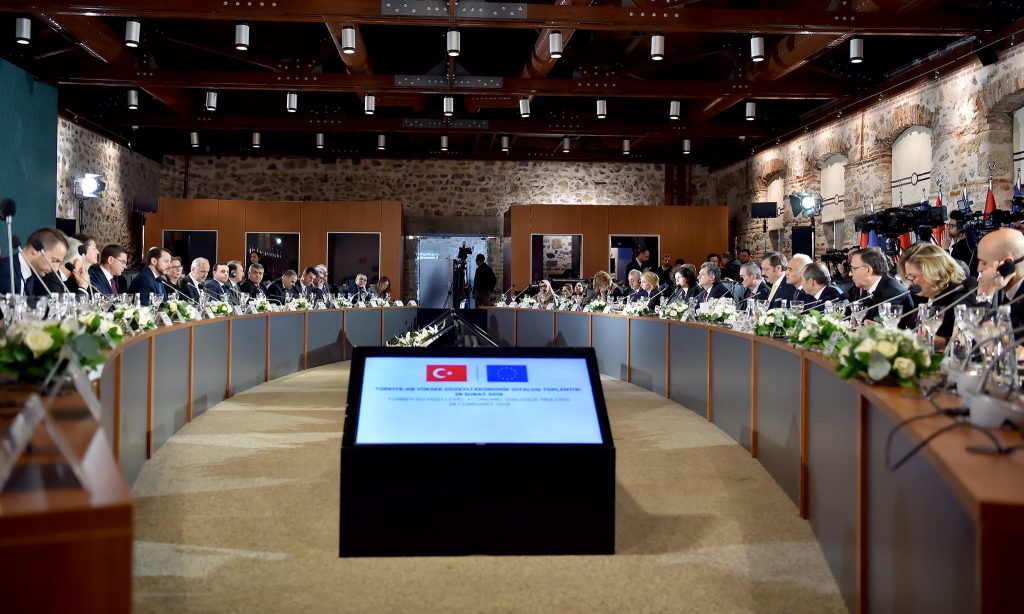A Crunch Year for EU-Turkey Relations: With or without Erdoğan
2023 will be a key year for Turkey. As well as celebrating the 100th anniversary of the Turkish Republic, voters will choose a new President and a new Parliament. But, with or without Erdoğan, is the EU likely to alter its stance on Turkey?
Next year’s elections will be critical for Turkey and may also redefine its relations with the EU. Amid Turkey’s rapid autocratization, the EU’s General Affairs Council in June 2018 effectively paused accession talks as well as any moves towards modernizing the EU-Turkey Customs Union. The Turkish government, meanwhile, has become less interested in a genuine relationship with the EU, which would require comprehensive domestic reform. This impasse has reduced relations to being largely transactional.
At present, the 2023 electoral outcome is up in the air. Recent opinion polls indicate that The Cumhur or People’s Alliance — made up of Recep Tayyip Erdoğan’s party AKP (Justice and Development Party) and its ultranationalist ally MHP (Nationalist Movement Party) — might lose the upcoming race for Presidential elections. But it remains to be seen whether opposition parties, realigned to form The Millet (or Nation) Alliance, will be able to agree on a candidate to challenge Erdoğan or present an electoral program that will inspire Turkish voters.
Deepening autocratic tendencies
Under the 20 years rule of the AKP, Turkey has shifted from being a defective democracy to an autocracy. The ruling elite has increasingly relied on a nationalist, conservative and majoritarian discourse. The nationalist tide became more pronounced following the June 2018 elections, when ultranationalist MHP and AKP established an electoral alliance. The ruling elite’s majoritarian understanding of governance has aggravated ethnic, religious, and political fault lines leading to political and social polarization.
Since the failed coup in 2016, repressive measures adopted under the state of emergency have become permanent features of Turkish domestic politics, forging an authoritarian country in a very short period. This is reflected in the 2022 Bertelsmann Transformation Index (BTI) for Turkey which highlighted three major challenges facing the country: “the consolidation of authoritarianism, economic vulnerability and an increasingly conflictual foreign policy.” BTI’s Political Transformation rating for Turkey stands at 4.80 out of 10 points, making it a “moderate autocracy”. This figure has sunk sharply from 7.25 points out of 10 in BTI’s 2016 report.
Domestic changes have also had negative foreign-policy repercussions, with Turkey emerging as a more assertive actor in its region and following an increasingly unilateral foreign policy line. Examples are Turkey’s recent operations in Northern Syria, its drilling activities in the Eastern Mediterranean since 2019 or its involvement in Libya, which have all been conducted with limited or even no consultation with Turkey’s Western Allies. In some cases, Turkey’s foreign policy preferences have clashed with the EU’s interests, for example, its non–alignment with restrictive measures adopted by the EU against Russia. On the other hand, Turkey’s growing armaments industry and rising nationalist tide provided a fertile ground for these unilateral foreign policy actions and the ruling elite’s mostly anti-Western, anti-European foreign policy discourse. Furthermore, with Turkey’s transition to a Presidential system in 2018, Turkish foreign policy has become less institutionalized, with the president’s palace monopolizing decision-making. This has rendered Turkish positions vulnerable to conjectural changes and short-term interests, making the country an unpredictable and unreliable actor in international relations.
Two scenarios for EU-Turkey relations in 2023
While Turkey has become more autocratic, the EU’s leverage power over the country has vaporized. Although 2023 is hard to predict, it is possible to outline two potential outcomes for Turkish politics and EU-Turkey relations.
In the first scenario, if the Erdoğan-led People’s Alliance wins the elections, it will likely result in a continuation of current domestic and foreign policies. In return, the EU would extend its pragmatic approach towards Turkey, emphasizing Turkey as a partner and prioritizing a relationship based on interests rather than values. However, in this scenario, while Turkey consolidates authoritarian trends, the EU and member states would remain reluctant to engage with Turkey. A relationship based on interests and EU’s priorities might, in turn, further consolidate Turkey’s autocratic power, rendering the country even more unpredictable and assertive in its region.
In the second scenario, if the opposition block can break Recep Tayyip Erdoğan’s 20-year-long reign, it would be realistic to expect a normalization process in Turkish politics. Such reform would likely take a long time, as the new government will inherit a dysfunctional governance system and economic woes from the AKP. Furthermore, ideological differences among the six opposition parties might hinder a functioning government. These differences might be particularly pronounced in foreign policy on the future of Syria, relations with Russia or Greece, or Turkey’s involvement in the Eastern Mediterranean. However, it is highly likely that a new reform process, albeit slow and symbolic, might change the EU’s perception of Turkey. This could help EU member states agree on a more positive agenda, setting in motion concrete incentives for sustaining Turkey’s reform process such as visa liberalization or customs union modernization. In this scenario, the EU’s capacity to lock Turkey in a reform process would add speed and sustainability to the process. This requires, on the one hand, establishing the EU’s credibility within Turkish society, persuading popular opinion that reforms will lead to Turkey’s close integration with the EU. On the other hand, it would also mean restoring a framework of conditionality, involving close monitoring, clear conditions, and credible incentives. Only then can the EU engage Turkey in a dialogue, build mutual trust, deepen interconnectedness, and ultimately re-establish its faded leverage over Turkey in a post-Erdoğan era.

